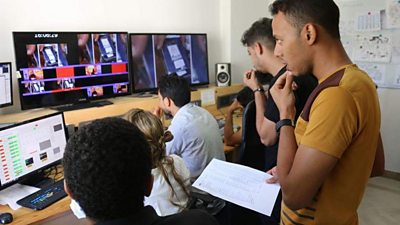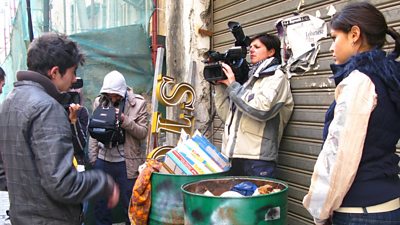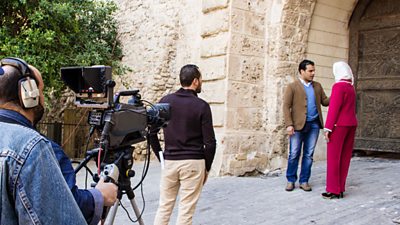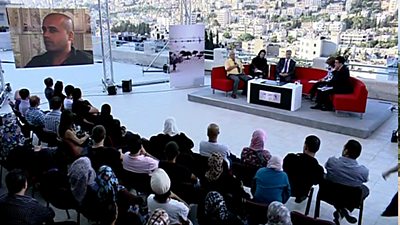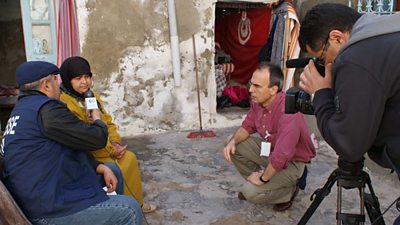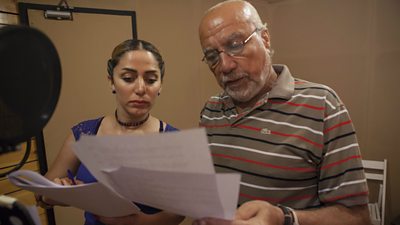is a Libyan social media platform with over 1.2 million followers. A team of Libya-based freelance reporters and Tunis-based �鶹�� Media Action content producers make daily El Kul content that promotes the inclusion and participation of women in society and tolerance of diversity amid the conflict.
We're proud that El Kul won 'Best Trust Initiative' in the 2022 !
Our quantitative research shows that El Kul’s daily content, made to �鶹�� editorial standards, has reached over 1.7m adult Libyans, or approximately 25% of the adult population. El Kul was ranked as one of Libya’s top five most active Facebook pages by MASAE in 2018. A monitoring survey of almost 700 audience members in March 2020 showed that 81% of audience members feel El Kul produces balanced content, 79% believe that El Kul covers issues that are important to their lives and 53% discuss El Kul content with family, friends and others.
During the COVID-19 pandemic, we also focused on providing Libyans with accurate health advice in line with WHO standards, and impartial reporting about the Libyan response to the crisis, to dispel myths and rumours. We aimed to provide a sense of shared experience, community and social connection at a time that can be divisive and isolating.
First to report on COVID-19 - and a scoop
El Kul was one of the first Libyan media outlets reporting on the pandemic before the first case in Libya was announced. The El Kul team scored a scoop when they made contact with a Libyan student at Hubei University in Wuhan – the epicentre of the COVID-19 story. The student chose to stay on in Wuhan because, in his words: “it’s more important to stay on and do what I can to help the citizens of Wuhan”. He told El Kul that he had received so much help and support from the people of Wuhan that now he felt it was time to give something back.
Traditionally, Arab students studying in China take Chinese names to make communication easier. Hafez said he had changed his Chinese name to Wuhan as a message of support. The post on El Kul’s Facebook page made an immediate impact. Within the first hour alone it had received more than 400 reactions, 168 comments and 42 shares. By December 2020, it had been viewed by more than 228,000 people.
The path ahead
In a conflict where public institutions are barely functioning, access to timely and accurate information is extremely vital. So is the presence and sustainability of independent media outlets. However, it remains very challenging for independent media platforms, like El Kul, to attract support that does not affect their impartiality.
Threatened by media polarisation in Libya and the negative financial impact of COVID-19 on the media sector, El Kul is exploring ways of sustaining itself beyond its donor funding. Amid uncertainty and limited funding sources, it remains extremely challenging.
Our team are working hard to continue to provide audiences in Libya with vital information, and to help mitigate the consequences of conflict, while supporting Libyans on their struggle for a peaceful and prosperous country. They are bridging the distances and differences among young Libyans by celebrating their cultural and ethnic diversity, and highlighting what unites them.
El Kul continues to strive to fulfil its slogan, ‘to tell people’s stories.’
Meet some of our team:
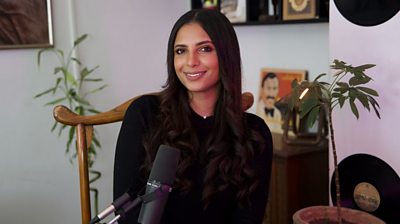
Eman Mohmed Alhaji, 30 – El Kul presenter and freelance network co-ordinator
I am from Ghadames, Libya. I studied journalism in university - I wanted to study for this career for many years. I like bringing stories from ground level into the public eye. And I enjoy being a public face in media, too.
The environment for journalists and media in Libya is very challenging, although I believe it is less challenging now when compared with years ago. I also believe it is more challenging for freelance journalists than it is for content producers, especially for women journalists. They are working hard to gather information on the ground and to cover stories, without press cards and or proper commissioning papers that would help to open more doors for them.
In my work with El Kul, I find that I learn something new every day. The appreciation and the support from my colleagues is rewarding too.
In term of challenges, coordinating a whole network of freelancers is not easy. I feel a responsibility to respond to them immediately, regardless of whether it is in working hours or not, or on weekends. I appreciate how hard they work, and that sometimes they have family and other work commitments. There is also the issue of power outages in Libya, which affects their participation in weekly meetings and how regularly they are able to communicate with me.
Regarding being the presenter. I know I must be ready to face some challenges, especially on social media – like negative comments or sometimes bullying. I know this is possible with this type of work but I have not experienced it much so far.
El Kul tries to highlight the stories of Libyan women and the challenges they face; we try to amplify their voices and focus on their contributions to society. We educate them sometimes, and help create support for their initiatives.
I have been working with El Kul for five years, but only now is my name clearly associated with it. I am proud of this work, because I started with it as a trainee and I never expected to be part of this team.
My work with El Kul has developed my skills and capabilities in leadership and planning. Working with El Kul really makes you feel the spirit of teamwork, and makes me proud of the content that I present.
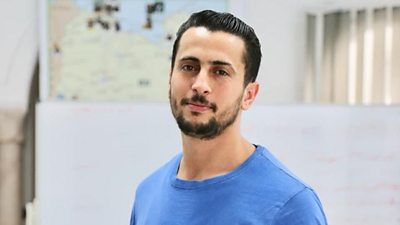
Mohamed Elalj, assistant editor
I began working on El Kul with �鶹�� Media Action in June 2019. At first, I participated in El Kul as a trainee; later, I officially joined the team as a content creator. Now I am El Kul’s assistant editor, managing and overseeing its editorial content and approach.
My career in media started in 2010, while I was a student in the local Faculty of Arts and Media, when I began as a news presenter with Libya Sports Channel. After the revolution, I worked with several Libyan TV channels and organisations as a broadcaster, reporter and news editor, including the state-owned Al-Wataniya and the media office of the National Oil Corporation.
I began postgraduate studies after finishing my first degree but the return of war to Libya in 2019 interrupted my studies. But this turned out to be a fortunate opportunity, as that is when I had the chance to join the El Kul platform officially.
Working with El Kul has helped me to further pursue my career in journalism and to develop my editorial skills.
I am fully dedicated to El KuI’s growth, and I work daily to better develop the project and support the team.
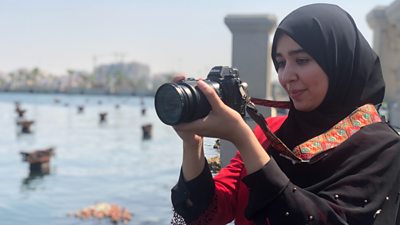
Wanssa Altamtam, alumni and freelance reporter
I work for El-Kul as a freelance journalist providing digital content.
I have been interested in media since my childhood. I graduated from the College of Law aiming to collect legal information and texts that protect women's rights, and make these more accessible to regular people, through media and communication including articles, videos, graphics, and interviews.
I always say to myself that I was fortunate to get involved in the El-Kul 2014 and 2017 training on digital media coverage and the principles of impartial media. Since then, we have all been working as part of a team. For us there is no difference between South, East, or West. All that counts is Libya and its meaningful stories.
I am interested in communicating these stories in a way that differs from the stereotypical images often portrayed by Libyan media, in accordance with official agendas, parties and policies. More traditional media are often indifferent to vulnerable groups and especially to women, whose role in the political and economic process and in decision-making is generally overlooked.
Our aim is to treat both men and women equally and provide them with equal opportunities.
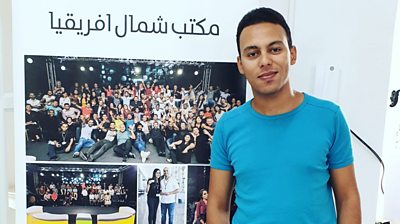
Mohammed Alsabber, digital content producer
I began my career in media five years ago, as a radio broadcaster and programmer, and later as a field reporter in Libya. Since 2016, I have been working with �鶹�� Media Action, initially as a trainee with El Kul – �鶹�� Media Action’s independent online news service.
When I applied, I already knew about El Kul’s work to train journalists in writing, commenting, presenting and other skills through watching and reading its content. The training has given me many new skills and enriched my existing experience. I was trained to write news and articles in an impartial way, and given advice on how to present them. I have also learnt new skills in photography, directing, producing and preparing the studio for filming. This initial six weeks of training provided not only useful information, but also the opportunity to make new friendships with the trainees, trainers and the �鶹�� supervisors.
As a freelance reporter for El Kul, my job was to transfer a full picture of Libya to El Kul’s digital platform. I have sent many written reports, photos and video clips from my city, Awjila, and many others, looking at Libya’s diversity, history, heritage and the peace process.
In late 2019, I moved to �鶹�� Media Action’s North Africa office in Tunis, to work as a digital content producer. This is a job that requires a lot of concentration, intellectual skills and good relations with others.
Along with my colleagues, we have produced many stories for El Kul that deal with issues related to women, diversity, immigration and gender. In this last year, we have found ourselves covering COVID-19 - an issue that has affected the whole world. I believe El Kul is important in providing digital content with a modern approach to narration, which moves away from traditional topics.
Each day, we try to cover issues that are relevant and interesting to citizens of Libya. These issues depict their everyday life and shed light on their suffering and expectations, with the aim of broadening their thinking and building understanding. Many of the issues we address are of a kind that our audience never thought would appear in local media.
I’m proud of the work we are doing to reach our audiences with topics that matter.
El Kul is funded by The Royal Embassy of the Netherlands, USAID, and Unicef.
Previous donors have included the UK FCDO, Dutch Embassy to Libya, Danish Refugee Council and UN Women.
